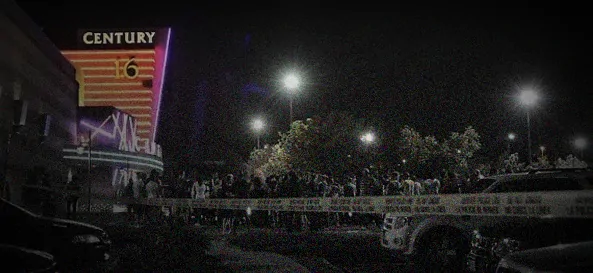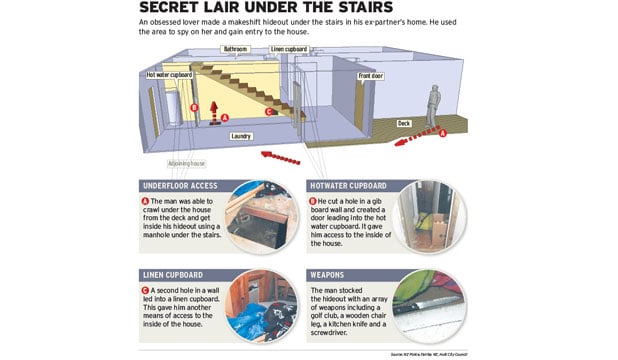
It was supposed to be the most exciting night in movies all summer. My husband and I were at the theater for almost nine hours, cheering, laughing and celebrating the conclusion to the Dark Knight saga with hundreds of eager fans. We followed the story of Bruce Wayne’s journey fighting for justice in Gotham from beginning to thrilling conclusion. It was only after the credits rolled and the audience departed with shouts of applause that people realized what had occurred while we and thousands of others crowded into theaters in the Denver Metro Area.
In our own town of Aurora, a portion of the chaos we had just witnessed on screen had become a nightmarish reality.
Twelve dead. Nearly sixty injured. Frantic evacuations in an Aurora theater, five apartment buildings and part of a medical school. The knowledge that dozens of our friends and family were watching the film the same night and we had no idea how many had chosen Century 16 as their venue of choice.
In the aftermath of mass tragedy, hearts turn immediately to the victims and their loved ones. As we mourn the departed, we reach out to the devastated friends and families who are left behind. When a tragedy is at the forefront of national news with headlines afire with the names and memories of victims, many are quick to offer compassionate support. But the loved ones left behind need just as much support in the coming years.
Just ask Sam Granillo. He wasn’t a victim. He hadn’t been at Century 16 when the violence occurred. He wasn’t even watching The Dark Knight Rises that night.
But thirteen years ago, Granillo held a cafeteria door shut while two teenage gunmen murdered 13 people and injured 21 more outside at Columbine High School. Granillo is one of hundreds of survivors of Littleton’s infamous mass shooting, an unforgettable trauma that is triggered again as future tragedies occur. When the victim information was released the day after the Aurora shooting, Granillo learned he had lost a friend.
“I don’t even know what to do … I feel like hell and the pit of my stomach is churning with sadness,” Granillo said, “My thoughts are with all those affected.”
Help for Those Left Behind
Columbine, Virginia Tech, Aurora and other tragedies leave both victims and survivors in its toxic wake. These heartbreaking events are difficult for anyone to process, whether they witnessed it firsthand or on the morning news.
Granillo recognized this in 1999, and has worked for the past decade to ensure that our nation remembers the victims we might forget: the survivors who will never be the same after witnessing the depravity of man face to face.
According to Granillo, the students of Columbine High School were offered free counseling to aid with the trauma, but many weren’t ready to speak about their grief yet. When they were ready, immediate help was gone.
Using his training and resources in the film industry, Granillo launched The Wounded Minds Project, a documentary production telling the story of survivors of the Columbine shootings, with the ultimate goal of creating and inspiring new relief outlets for those affected by similar trauma. The project has received attention from news outlets and celebrities, and is nearing its first goal of $10,000 to produce a trailer that will raise awareness of the film’s key issue: honoring the victims of mass tragedy and remembering the scars of the survivors.
“There are several hundred of us left in the position to deal with this trauma on a daily basis without any resources,” Granillo said, “We have become our own therapists over the years and we need a better solution.”
But he hopes this does not have to be the outcome of the Aurora shooting. For those wondering what they can do to help, Granillo said, “I think that the best thing anyone can do is just be there for anyone who needs it. If you have someone you know who was affected, go and be with them. They don’t need to talk about it. Don’t make them talk about it. Just be there. Be there to listen. If they need to talk, be there to hug. If they need to cry … and just being around somebody who needs it is the best thing you can do.”
Help and Healing for the Long-Run
What about those in other states, those who didn’t have anyone close affected? Prayer is the most instinctive response, but how can we sustain compassion as months pass and the memory slips from our minds with the headlines?
First, we can honor those affected by acknowledging the pain. This acknowledgement might be as simple as sending a card to victims’ families every anniversary, or it might be a larger-scale effort like the Wounded Minds Project. We can look to the history of our own cities and ensure victims of similar events have not been forgotten. Churches can hold services in support of those affected or fundraisers for victim support.
We can dive into tough questions that must be answered. Where is God in all of this? We can only effectively answer these questions by confronting them head-on. Educators and youth leaders can use the opportunity to open up discussion with students about the cost of violence, loving our neighbors and being light in the darkness. We can even use Bruce Wayne’s example—we may not fight injustice in an armored suit, but when God calls us to a cause, do we have the courage and the will to act?
Holocaust survivor Elie Wiesel once told the story of watching the hanging of a young boy. A prisoner asked him, “Where is God now?” A voice inside responded, “Here He is. He is hanging here on the gallows.” We don’t often realize what it means that Christ took the sins of the world upon Himself. It means He was there in the theater, pierced by bullets with the victims. He was scarred by the shrapnel. His eyes were scorched with gas and then burned with tears as He mourned alongside the broken.
In times of tragedy, we can pray more sincerely. When the blinders of peacetime and comfort are pulled from our eyes, we remember even though good and beauty remain on the earth, evil still endures for a time. Christ shared a story of a field sown with weeds by an enemy in the night. In order to save the harvest, the master ordered that the weeds be left to grow up with the wheat so the harvest could be saved. Throughout the Dark Knight saga, there are some who believe corrupt Gotham should be wiped out in the name of raw justice. Yet Batman disagrees. Even though it means sacrificing his body, his loved ones and his livelihood, Batman fights for the city’s restoration not by destruction but mercy, believing that good will triumph over evil and that Gotham’s people can be saved.
God did the same with us, knowing the pain that would follow and the sacrifice that would have to be made so mankind could be saved. In these dark days of national tragedy, we understand why the world can’t stay this way forever—it has to be made new. We were never meant to live this way. Like Gotham, we eagerly await the return of our own watchful guardian.
And in the meantime, we pray, remember, mourn with those who mourn and rally ourselves from apathy to compassionate service.






















